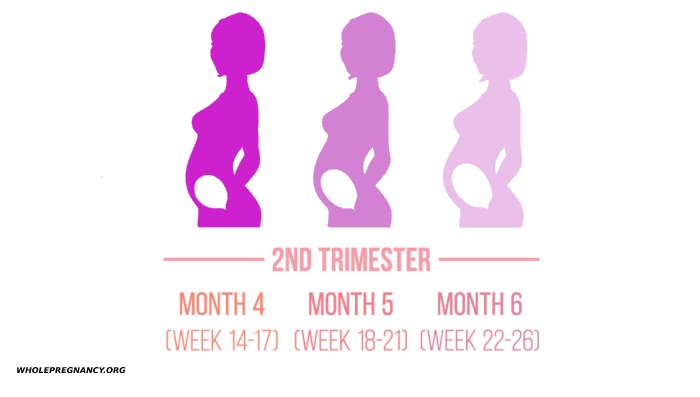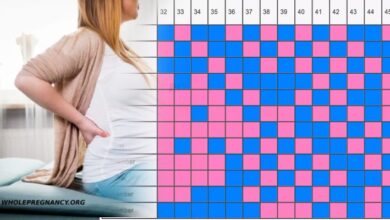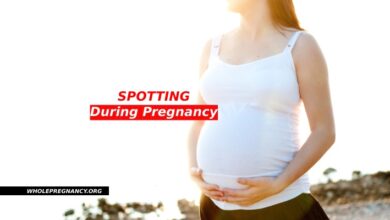The Second Trimester of Pregnancy

Your second trimester of pregnancy lasts from weeks 13 to 28, or the months 4, 5, and 6, respectively. This is the middle stage of your pregnancy. You may begin to feel your baby moving for the first time and see your “baby bump”.You should feel less fatigue and morning sickness as you move into your second trimester. For many women, the second trimester is the easiest three months of pregnancy.
Start planning for your baby’s arrival now that you feel better and have more energy.Your baby’s growth rate is rapid in the second trimester. You will have an Ultrasound between your 18th and 22nd weeks of pregnancy so that your doctor can track how your baby is doing. If you don’t mind being surprised, you can also learn the sex of your baby. You might also find out if your baby is having twins during this trimester. Even though you may feel better, there are still big changes happening inside of your body. Here are some things you can expect.
Changes in your body during the second trimester of pregnancy
You may feel achy in the lower abdomen. You may feel some cramps in your lower abdomen during your second trimester. Cramps occur because your uterus expands during pregnancy and puts pressure on nearby muscles, ligaments, and tendons. Your round ligament muscle can cramp during your second trimester of pregnancy. It stretches and contracts as it goes. It may feel like a dull ache in the lower abdomen or as sharp stabs. Minor cramps are common and can be caused by constipation or gas. You can relieve the pain by taking a warm bath, relaxing exercises, and pressing down on your lower abdomen with a hot water bottle.
Backache:
All the extra weight you have gained over the past few months is putting pressure on your back. This can cause it to ache and become sore. You can relieve the pressure by sitting straight up and using a chair that offers good back support. With a pillow between your legs, you can sleep on your back. Do not carry anything too heavy. Comfortable, low-heeled shoes with good arch support are best. You can ask your partner to massage the sore areas if it is truly unbearable. Or, you can treat yourself to a pregnancies massage.
Bleeding gums:
About half of pregnant women develop swollen, tender gums. Your gums become more sensitive due to hormone changes, which can cause them to bleed easily. After your baby is born, your gums will return to normal. Use a soft toothbrush, floss gently, and don’t forget to brush your teeth. Studies have shown that pregnant women suffering from gum disease ( periodontal diseases) are more likely to enter preterm labor and give birth to a baby of low birth weight.
Braxton-Hicks contractions:
During the second trimester of pregnancy, you may feel your uterus muscles tighten for a few minutes. These are not signs or contractions of labor. They are a normal symptom. These may be irregular in strength and rhythm, and can feel like they come and go at will. These muscle contractions can cause more discomfort than pain. Braxton-Hicks contractions can be triggered by intense exercise, sexual activity, dehydration and a full bladder. These contractions can be used to help you practice your labor breathing techniques. Relax by taking a hot bath, drinking warm herbal tea, changing your body position or drinking more water.
Read also: The Third Trimester
Breast enlargement:
Most of the tenderness experienced in the first Trimester should have worn off. However, your breasts continue to grow as they prepare for feeding your baby. You may feel more comfortable by going up in bra size or wearing a supportive bra.
Congestion, nosebleeds:
Your nose may also bleed more easily due to hormonal changes. Check with your doctor before using a congestant. You may also be able to clear your congestion using natural methods or saline drops. To keep the air moist, you can also use a humidifier. Keep your head straight and don’t tilt your head back to stop a nosebleed. Then, apply pressure to the nostrils for a few seconds until it stops.
Vaginal discharge:
You may notice a thin, white-colored vaginal discharge (called “leukorrhea“) early in pregnancy. If you prefer to feel more comfortable wearing a pantyliner, but not a tampon as it can transmit germs to the vagina. Call your doctor if the discharge is strong, foul-smelling, green, or bloody.
Dizziness:
Your uterus expands in the second trimester and presses against blood vessels, causing dizziness at times. Low blood sugar and hormone changes during pregnancy are other causes. Do not stand for too much. Slowly get up from the chair or bed. Regular meals and snacks are important. Keep hydrated. Avoid hot baths and showers and keep your baby hydrated. If you feel faint, pass out, have persistent bleeding from the uterus or are experiencing abdominal pain, consult your doctor immediately.
Regular urination:
During the second trimester of your pregnancy your uterus will rise from the pelvic cavity, giving you a short break from going to the toilet. However, don’t be too comfortable. You will feel the urge to travel during your last trimester.
Hair growth:
Pregnancy hormonal treatments can increase hair growth, but not always in the places you desire. Your hair will get thicker. It is possible to see hair growing in places you have never seen before. This could include your arms, back, face, and arms. Tweezing and shaving may not be the best options but they are probably the safest. Experts don’t recommend electrolysis, waxing or depilatories for pregnant women. This is because there’s still no evidence that they’re safe. Ask your doctor for advice.
Headaches and Heartaches:
They are the most common pregnancy complaints. Deep breathing and rest are important. You shouldn’t take ibuprofen or aspirin during pregnancy. However, your doctor might allow you to take Acetaminophen for discomfort.
Constipation and Heartburn:
Are symptoms of your body producing more progesterone. This hormone relaxes some muscles, such as the ring in your lower stomach that helps keep food and acids down and moves food through your intestines. Heartburn can be relieved by eating smaller meals and avoiding spicy and greasy foods, such as citrus fruits. To prevent constipation you should eat more fiber and drink more fluids. Exercise can also be helpful.
Hemorrhoids:
Hemorrhoids are actually varicose veins swollen blue or purple veins that form around the anus. These veins can grow larger during pregnancy due to increased blood flow and pressure from the growing uterus. Varicose Veins are itchy and can cause discomfort. You can relieve them by sitting in a warm bath or sitz-bath. Ask your doctor if you are allowed to use an over-the counter hemorhoid cream.
Leg cramps:
During the second trimester of pregnancy, you may feel your legs contracting and cramping. These cramps often occur at night. They are often experienced at night. You can prevent cramps by stretching your legs before going to bed. Get regular exercise and eat foods high in magnesium, such as beans or whole grains. Also, make sure to get enough fluids. Stretching, heat, and massage can help to ease leg cramps.
Quickening:
At the 20-week mark of your pregnancy, you should feel the first flutters in your abdomen. This is commonly called “quickening”. Don’t be discouraged if you don’t feel your baby moving yet. Some women experience rapidening only in the sixth month of their pregnancy.
Skin changes in the second trimester of pregnancy:
Pregnant woman often appear “glowing” due to hormonal fluctuations that make the skin appear more flushed. A rise in pigment melanin may also cause brown spots on the skin (often called “masks of pregnancy“) or a dark line (lineanigra) at the center of the abdomen. These skin changes should disappear once the baby is born. To conceal these skin changes, you can use make-up. You are also more sensitive to sunlight right now. Make sure you use a broad-spectrum sunscreen (UVA/UVB protection), with at least 30 SPF whenever you go outdoors.
Wearing long sleeves, pants, a hat with a wide brim and sunglasses is a good way to limit your exposure to the sun. Your abdomen, breasts and thighs may be noticeably reddish-purple. These stretch marks appear as your skin expands in order to accommodate your growing belly. There is not much evidence to support the claims of many lotions and creams that they can prevent or eliminate stretch marks. A moisturizer can soften the skin and reduce itching. After you have delivered, most stretch marks will disappear on their own.
Spider veins and varicose Veins:
You have increased your circulation to supply more blood to your baby’s growing body. Spider veins can form on your skin from the excess blood flow. Once your baby is born, these veins will fade. Your growing baby’s pressure on your legs can cause blood to stop flowing to your lower body. This can lead to the veins in your legs becoming swollen, blue, or purple. These are known as varicose veins. Varicose veins can’t be avoided. However, it is possible to prevent them from getting worse. For extra support, wear support hose. After 3 months, varicose veins will improve.
Urinary tract infections.
Infections of the urinary tract, or bladder, that sits on top your uterus, can be common during the second trimester. These infections are caused by changes in the urinary tract, or your growing bladder making it more difficult to empty your bladder. There may be symptoms such as pain when you have to pee, burning sensations, frequent urges to pee, cloudy, smelly urine, lower stomach pain, and traces of blood or pus in your urine. Bladder infections can spread and cause kidney damage, early labor, or low-weight babies. See your doctor immediately. To diagnose the infection, they will perform a urinalysis as well as a urine culture. Then, they will prescribe antibiotics.
Weight gain during the second trimester of pregnancy:
Morning sickness usually disappears by the second trimester. Your appetite will likely grow and should recover after that. While food looks more appealing, you should be mindful of how much you eat. The second trimester should only require 300-500 calories more per day, and you should gain about 1/2 to 1 pound each week.
Emergent Symptoms during the second trimester of pregnancy
These symptoms could indicate that there is something wrong with your pregnancy. Do not wait until your prenatal visit to discuss it. If you are concerned, call your doctor immediately.
- Extreme abdominal pain or cramping
- Bleeding
- Severe dizziness
- Rapid weight gain (more that 6.5 pounds per months) or too little weight growth (less than 10 lbs at 20 weeks).
- Jaundice
- Vomiting
- It’s a lot of sweat
Baby’s Growth in The Second trimester of Pregnancy
Your baby can grow up to 3 lbs and 16 inches during the second trimester of pregnancy. Their brain and other organs develop and grow a lot. Their heart pumps 100 pints of blood per day. Although their lungs are fully developed, they are not yet ready to breathe. Your baby can move and kick in your womb. They can also swallow, suck, and even hear you. Your baby’s eyes and ears will move in the right places on its head. Their eyelids are able to open and close.
The baby wakes up and goes to sleep in a regular cycle. They develop eyebrows and eyelashes. Baby grows toenails and fingernails. They have separate fingers and toes. They leave distinct toe and fingerprint prints. Your baby’s hair grows on its head. The lanugo is a downy, fine hair that grows all over the body. The vernix caseosa is a protective cream that covers their body and is eventually absorbed by their skin.This is the time when your baby’s placenta has also reached its full development. Your baby’s placenta is an organ that provides oxygen and nutrients to your baby. It also eliminates waste. Your fetus begins to accumulate fat in the second trimester.
Twins: Second Trimester of Pregnancy Tips
Two? These are some thoughts to consider:
- Find a doctor. Discuss with your OB the possibility of seeing a specialist in maternal fetal medicine (MFM), an OB who specializes on high-risk deliveries.
- Take a break! Don’t feel guilty about taking an afternoon off if you are tired. You use 10% more energy when you rest than a woman with one baby.
- Take your omega-3s. Twins like fish, Omega-3s can be found in salmon, herring and sardines.
- Are you getting enough vitamins? Ask your doctor if you can get enough vitamins by taking a prenatal vitamin.
- Do not buy more than one of each baby gadget. Wait and see what your babies love,some babies love swings and bouncy chairs, while others do not. A crib is not necessary, at least at the beginning. Your children may sleep more comfortably together.
- Three meals a day.
- Do you need to reduce your exercise? Ask your doctor after 20 or 24 weeks if you have to stop doing any exercise. If so, what are the safest things to do.
- Consider getting a breast pump. You may have to start pumping your milk if your twins spend time in the NICU. This will be easier if you have a pump on hand.
- Make a birth plan. This will allow your birth team to know your labor and delivery desires. If things don’t go according to plan, you can be flexible.
- Do not wait to find child-care. You’ll need two slots, so it is important to start looking for childcare early.




